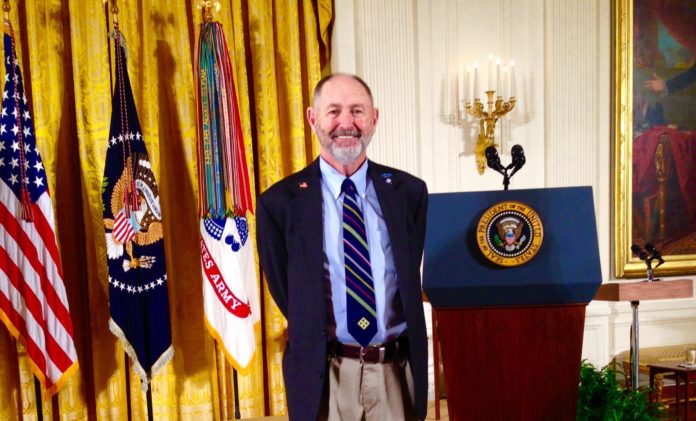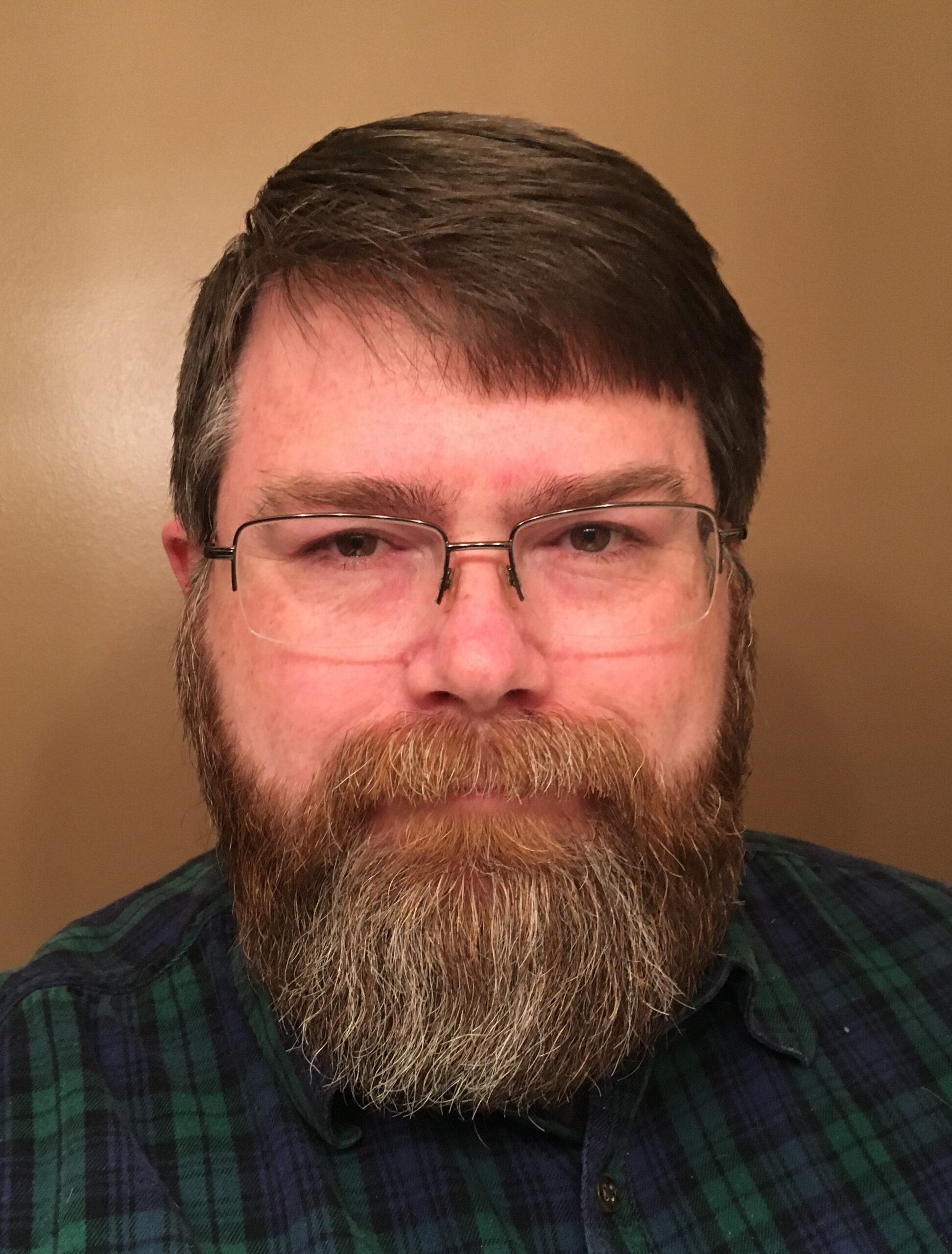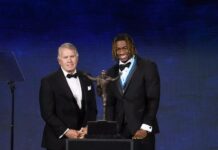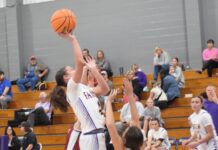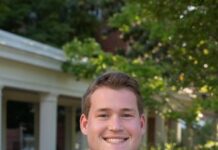‘You can thank me by being a good American’
Christy Perry
CULLMAN, Ala. – Cullman resident Gerry Howard is a Vietnam veteran who served with Alpha Company, 1st Battalion, 8th Infantry Regiment, 4th Infantry Division. He served from May of 1969 to March of 1970 as a draftee platoon leader. He has dedicated his life to honoring fellow veterans and advocating for veterans’ rights and causes.
As the country celebrates the 4th of July, it is his hope that people remember patriotism more than just a long weekend.
He also reminds people, “Respect your neighbors and your veterans. Don’t go off popping fireworks at us. I STILL have a startled reflex to all that noise.”
He does understand that fireworks can also be patriotic.
He said, “Know your neighbors! I like a long weekend too, but stick a flag on your boat. Do something.”
Howard buys each new neighbor in his neighborhood a flag for their home when they move in and he is often dismayed at how few display the flag. He said he even found one in the garbage.
As a Vietnam veteran, Howard said their homecoming was different from those of other wars. He told a story about being denied a job due to fighting in Vietnam.
He said, “Even the other veterans didn’t like us. Today when people say ‘Thank you for your service,’ it’s late coming. We were treated with less than respect. When you’re a Cullman County boy and you get drafted, you go do what’s expected of you.
“The stereotype is the worst oxymoron in our society that’s ever been- 99.99% of Vietnam veterans got on with their lives and became productive Americans. I had to take an early retirement for health reasons nine years ago and I try to spend time every day to do something to do away with the stereotype.”
Howard keeps busy with his involvement in the National 4th Infantry (Ivy) Division Association.
“Our primary concern is to get 4th Infantry, all eras, to reunite and do good. We have a service officer that works full-time on helping guys get benefits, and we have meetings every year. I joined 35 years go for therapy for myself and it worked,” he said. “I do other volunteer work in the veterans’ area. We have a suicide team.”
Howard recalled the last veteran his team tried to help. The man took his life due to the chronic pain he was unable to endure.
“The state politicians have limited the amount of pain killer you can give in an effort to help stop the epidemic of opioid abuse. There’s a percentage of people of people who need more than that. Two (veterans) a day in Alabama kills themselves. Two a day. Primarily, the guys my age who don’t have the education or the strength to play the system. Then they play the system then the pain people say, ‘You can have 70 mg a day. You can get a seven-day supply.’ If you’ve got a chronic Agent Orange condition and you can’t stop hurting, what do you do?” Howard asked.
Howard has been to the governor’s office and the CDC with a task force to try to help break down the barriers that exist for veterans.
He said, “There’s got to be a screening process to separate illegal drugs, over-prescribing, and occasionally, there’s somebody, I’m one of them, that needs them. There are days I can’t get out of bed. Wait until the clock can go so I can take one more pill. If I take more than they give me, then I’m in trouble. They make me come to Birmingham to have my pills counted and I’m treated like a criminal.”
Howard suffers from the exposure to Agent Orange in Vietnam. Agent Orange was a dioxin used in Vietnam as an herbicide and defoliant chemical.
He explained, “It took decades for the government to approve any of our conditions, hoping we would die off. I hate to be so blunt, but I’m honest as I can be. They couldn’t pay enough unless they started another printing press to take care of at least 100,000 people poisoned.”
He continued, “Dioxin, the primary chemical, was developed at Ft. McClellan. Those of us who trained at Ft. McClellan, I did twice, was exposed to it there and then went to Vietnam and slept in the stuff.”
Agent Orange was used to move defensive positions by killing the thick vegetation. Howard, who worked as a drug rep for 30 years, said he spent a lot of time studying the dioxin molecule. He learned that it has a half-life of 700 years and is the third harshest poison in existence.
He added, “The places that were defoliated in Vietnam, in America and Canada and everywhere else they used the purest form of dioxin, there ain’t nothing growing there now and there won’t be 100 years from now.”
Calhoun County reached a settlement with Monsanto in 2013. The manufacturer of the dioxins and PCBs agreed to pay $700 million to compensate the county and its residents for the clean-up and contamination caused by the chemicals.
Howard pointed out, “But they didn’t pay the soldiers.”
In the mid-70s, a group of doctors began a study of those exposed to Agent Orange.
Howard said, “In my particular case, they took seven samples including hair, skin, bone, semen and others. In five of the seven, there was Agent Orange floating around. There were seven forms of agent dioxin and they put it in different colored barrels. That’s why it’s called Agent Orange. They used it because it worked so well.”
He recalled one mission he had in Vietnam that, “killed us.” He explained, “It was called a bomb assessment detail. We were grunts and we lived in the woods. We were supposed to go out to an area that was defoliated. We couldn’t fight the enemy out of that valley so we defoliated it so they wouldn’t have a place to hide. My platoon was given a bomb assessment mission to walk through that valley. It killed us. Everyone in my platoon has diabetes. EVERY ONE of us. Half of my platoon is dead already. Anyway, the job was to walk through this valley and count plants 6 inches high, 6 feet high and 16 feet high that were still alive. There weren’t any. The three nights we were in there, in the morning we would wake up and had to pat down our arms and stuff to get the dioxin powder off.”
Through his own struggles, Howard has worked tirelessly to better the treatment of all veterans. Howard and The National 4th Infantry (Ivy) Division Association have also been successful in building the 4th Infantry Division memorial in Arlington Cemetery and nine other memorials.
On Aug. 17, 2017 Howard received the Order of St. Maurice Medal during a ceremony on Founder’s Field at Fort Carson, Colorado. The Order of St. Maurice Medal recognizes those who have served the infantry community with distinction, demonstrated a significant contribution in support of the infantry and represented the highest standards of integrity, moral character, professional competence and dedication of duty.(www.cullmantribune.com/2017/09/05/4th-infantry-division-veteran-from-cullman-receives-order-of-st-maurice-medal/)
“I am not bitter person. I did the American dream. I raised a step family, went to school and prospered,” Howard said. “Society wasn’t ready for us. We were going to carry the memory of the guys we lost, the draft dodgers, being pardoned …we had a lot in our basket.”
Howard encourages everyone, “If you ever go to D.C. you need to spend at least a day around the Lincoln Memorial and see all the other memorials that are right there. All the other memorials, people laugh, joke, throw their trash on the ground, but at the Vietnam Wall, its quiet. No bicycles, no screaming; the kids are there, but it’s quiet. It’s moving. I still cry when I go after dozens of times. Every time I go up there, I spend one day at the wall showing people how to find a name. It’s not about me. It’s about what we as a group have done versus the perception of what we were, baby killer drug addicts. There’s been an effort the last few years to say, ‘Thanks for your service.’ You can thank me by being a good American.”

